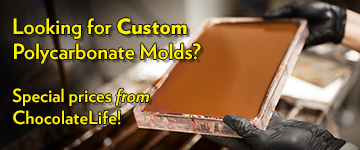well, if i tell you the results before you test, it can skew your perception 8-) test it and see...
Chocolate oxidation
Ok I am going to test it  . How does it affect the taste?
. How does it affect the taste?
Thank you
you'll taste it far before you see it, but given enough time, the color will lighten. by the time it's noticeably lighter, you don't want to eat it...
Great Tom and Sebastian. THanks to both of you. It makes a lot more sense now and indeed photooxidation or degredation would be a better term. I was just curious to understand how that exposition to light can degrade chocolate. I know what sugar and fat blooms look like and I was wondering what oxidation could do.
photodegredation of proteins and lipids is very common. Most of it's due to UV lights (think fluorescent lighting). Many fats are susceptible to it, the shorter chain and less saturated the fat, the faster it will occur. it's the reason your milk doesn't come in clear containers.
THank you Tom and Larry,
Larry, very interesting read However I think oxidation isn't about heating chocolate or that would just be the "fat bloom" problem we encounter with chocolate. Or is it that when people talk about the oxidation of chocolate by light they mean the infrareds heating up chocolate?
I guess I am more looking for a description of what happens in the oxidation process of chocolate by LIGHT.
Thanks to anyone who could have such a description of the process
 http://www.thechocolatelife.com/group/nerdzone/forum/topics/chemistry-of-chocolate-seizing-by-heat
http://www.thechocolatelife.com/group/nerdzone/forum/topics/chemistry-of-chocolate-seizing-by-heat
Hi all,
I keep on reading that chocolate's fats can oxidate when in contact with light... I can't make sense of it. Oxidation is a transformation process due to oxigen (air) so why do they always refer to the oxidation of cocoa's fats by light?
If anyone has a scientific explanation, I am eally interested.
Thanks for your lights.
Olivier
updated by @olivier-l: 04/11/25 09:27:36
Tags
Activity
Chocolatevenue is an online chocolate store in India.We are specialized in customized chocolates .Chocolates can be customized as chocolate message and chocolate bars.
You can get written your message on chocolates and can get customized your chocolate bars by selecting the desired ingredients.
for more details
FOR SALE / BARGAIN / FINE CACAO LIQUOR, COLOMBIA ORIGIN
Enjoy a delicious premium chocolate from the Boyacá region of Colombia, considered among the best in the world. We offer a 200 kilograms lot of pure origin cocoa liquor, fair trade / ethically sourced. N o other ingredients added.
The price for this high quality product is as follows:
1 kg - US$ 13
100 kg - US$ 12 per kilo
200 kg - US$ 11 per kilo
Inquires: equalcolombia@gmail.com
- See more at: https://www.thechocolatelife.com/colorchocolate#sthash.JFDWYFuK.dpuf
- See more at: https://www.thechocolatelife.com/community/forums/my_posts/18453/fine-cacao-liquor-colombia-origin#sthash.2pUq4Eu3.dpuf
The headline says it all: United Cacao: the sad tale of when things really go wrong for Aim investors .
Two changes we made with the chocolate is that this time we winnowed the chocolate. This time we didn't use a blow dryer to melt the chocolate. Two improvements with the chocolate is that the melanger didn't get clogged this time and everyone put in work.

